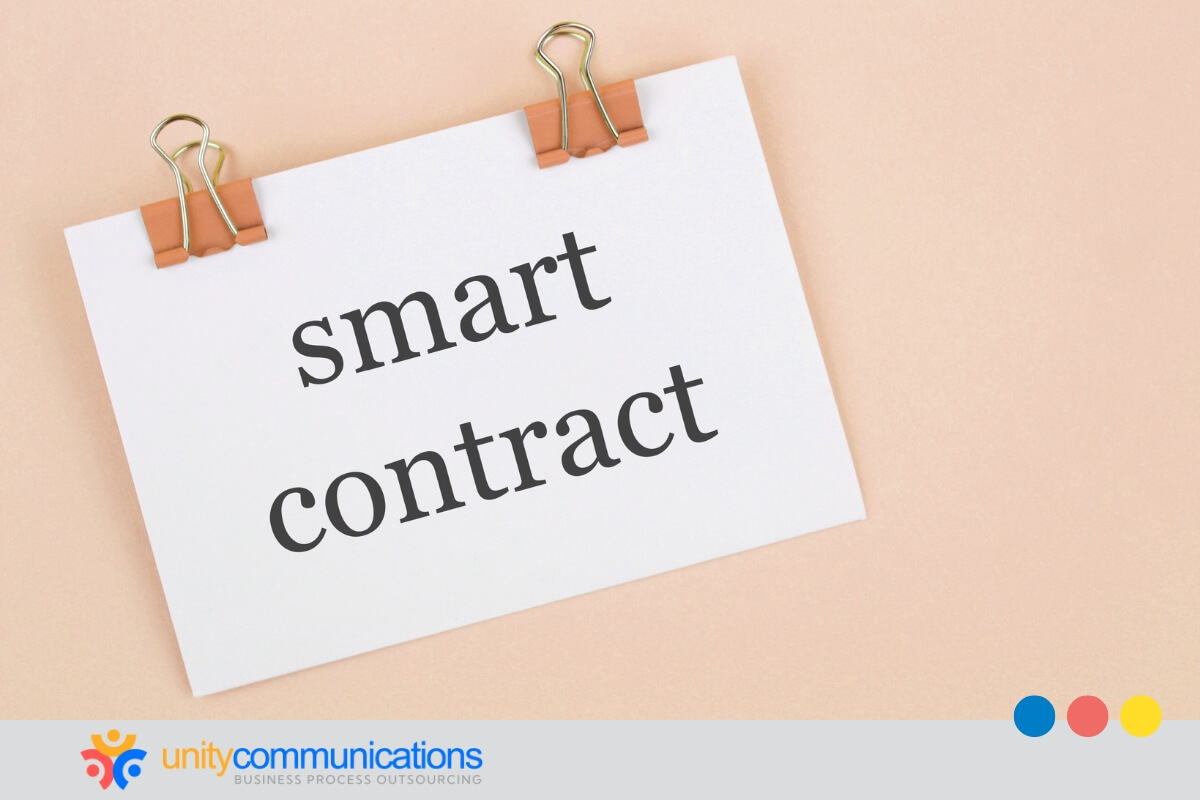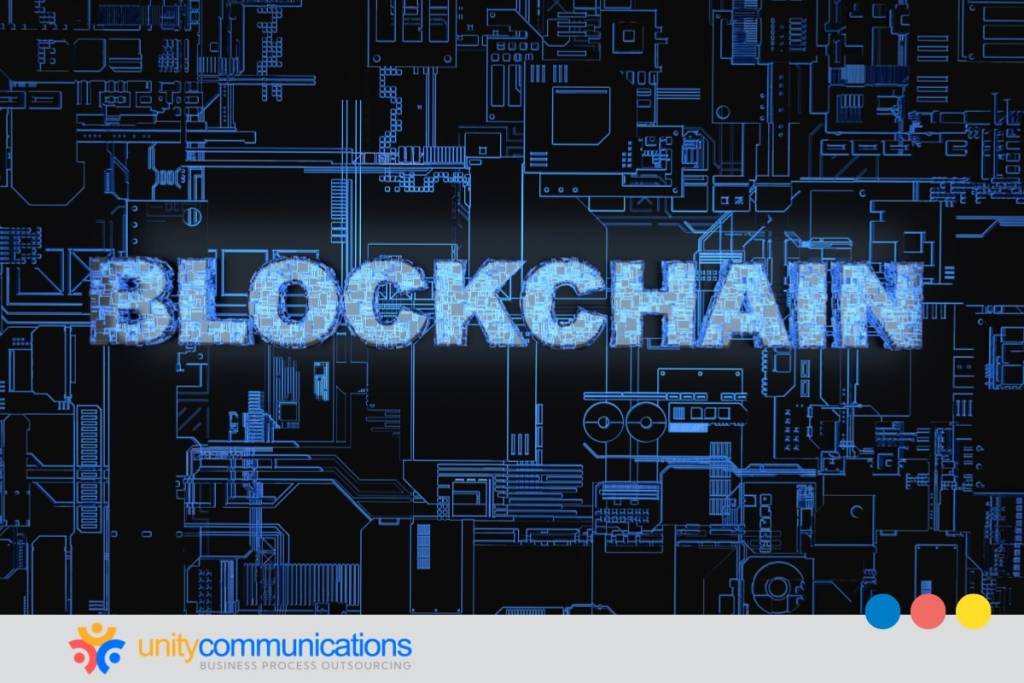IN THIS ARTICLE
Table of Contents
More industries integrate blockchain technology into their processes. Its decentralized nature, immutable records, and enhanced security make it attractive for businesses looking to streamline operations and increase transparency.
However, it is complicated. Business process outsourcing (BPO) emerges as a viable strategy for managing the complexities of blockchain technology. Outsourcing provides specialized expertise and resources to support blockchain development teams and companies.
This article examines how BPO services can help optimize blockchain initiatives. Keep reading!
Understanding blockchain technology: An overview

Blockchain technology creates a decentralized digital ledger that records transactions via a network of computers. A distinct alphanumeric code called “hash” connects each data block, hence, “chain” in its name. Like a crowdsourced bookkeeper, it safeguards and confirms transactions to produce an unchangeable history.
The digital ledger works similarly to a shared spreadsheet. While everyone can view the data, no one can alter it because each transaction is encrypted, kept in a block, and connected chronologically.
The blockchain technology market is widespread. It could grow to $825.93 billion by 2032. Its extraordinary adaptability shapes various industries, including healthcare, supply chain, property markets, banking, and medical research. Most use it to protect confidential financial data while enhancing supply chain transparency.
Primary components of a blockchain network
Blockchain networks comprise several interconnected components that ensure security, transparency, and decentralization:
- Peer-to-peer network: a decentralized network where computers (nodes) communicate directly with each other without relying on a central authority
- Node: a computer connected to the blockchain network verifies and records transactions
- Ledger: a digital record of all transactions on the blockchain network, distributed across all nodes for transparency and immutability
- Wallet: a digital application that stores, sends, and receives cryptocurrency and interacts with the blockchain network to manage transactions
- Nonce: a random number added to a transaction to make it unique and prevent double-spending
- Hash: a cryptographic function that converts data into a unique string of characters to maintain the transaction’s integrity or prevent tampering
- Consensus mechanism: a set of rules determining how nodes agree on the validity of transactions and the ledger’s state, including proof of work (PoW) and proof of stake (PoS)
- Smart Contracts: self-executing contracts with terms directly written into code that can automate processes, enforce agreements, and reduce the need for intermediaries
- Cryptography: uses mathematical algorithms to encrypt and decrypt data and ensure privacy and security
The synergy between BPO and blockchain technology
Integrating BPO services into blockchain technology support is ideal for improving large-scale operations efficiency.
A blockchain project involves real-time data management and extensive compliance requirements. BPO companies help streamline these aspects by offering specialized expertise, from managing customer interactions to maintaining transactional records.
Outsourcing blockchain-related processes offers several benefits, such as cost savings and scalability. Leveraging BPO services for functions such as customer support and data entry also allows companies to redirect internal resources to more critical activities.
Role of BPO in blockchain technology support
What is BPO’s role in blockchain technology support? It provides comprehensive assistance in non-core activities to ensure efficiency. With BPO support, developers can focus on more complex and technical aspects of blockchain technology.
Critical responsibilities of BPO in blockchain projects include:
- Data management: efficiently handling large datasets, ensuring accuracy and real-time updates
- Customer support: providing seamless communication between users and blockchain platforms through customer service
- Compliance and security: preventing security breaches and adhering to regulations, two critical pillars on which every blockchain project must stand
Enhancing blockchain data management with BPO services
BPO companies excel at handling large volumes of customer data, which is essential for blockchain platforms. Developers must keep records clean, current, and accurate. By outsourcing data management, companies can maintain the integrity of their information.
BPO firms deploy skilled professionals and advanced tools to manage data effectively. By leveraging external expertise and resources, developers can significantly reduce operating costs. Businesses can then reallocate savings from outsourcing to other aspects of blockchain projects.
Leveraging BPO for blockchain customer support

In any tech-driven world, providing excellent customer support is essential to building trust and ensuring a positive customer experience.
BPO companies offer multi-channel support, including phone and social media, to help users resolve issues directly. Along with customer service representatives, providers deploy chatbots to provide real-time assistance and improve the customer experience.
Businesses can establish a 24/7 connection with users to solve their problems. By outsourcing customer service, blockchain platforms can improve communication while focusing on their core development activities.
BPO in blockchain security and compliance
BPO providers assist companies in overseeing security protocols, conducting regular audits, and meeting regulatory requirements. Key BPO services for blockchain technology support also include monitoring and managing transactions for fraud detection and prevention.
BPO partners guide blockchain platforms in complying with Know Your Customer (KYC) and Anti-Money Laundering (AML) regulations to prevent and control fraudulent activities and financial crimes.
Money laundering costs about 2% to 5% of global GDP, or about $800 billion to $2 trillion annually. Meanwhile, wire transfers still account for the highest value of fraud loss despite the increasing number of technology-enabled frauds, such as card-not-present (CNP) credit card fraud.
BPO services offer robust strategies to help developers ensure security and compliance in blockchain projects.
Optimizing blockchain transaction processing through BPO
Blockchain transactions require smooth processing for business operations to flow. BPO companies safeguard transactions with speed and confidentiality. By harnessing cutting-edge tech and established workflows, BPO services reduce errors and accelerate processing times.
Moreover, outsourcing to BPO companies enables businesses to save costs by reducing their in-house processing expenses.
Best practices for integrating BPO with blockchain initiatives
The right BPO vendor can distinguish between winning and losing for blockchain developers and business strategists. Best practices for integrating BPO with blockchain initiatives include:
- Assessing the BPO provider’s experience in handling blockchain technology and similar projects
- Establishing clear communication channels and service-level agreements (SLAs) to ensure smooth collaboration
- Choosing a BPO partner that offers flexibility and scalability to accommodate growth and evolving needs
The future of BPO and blockchain technology is closely intertwined, with both expected to grow together. Integrating artificial intelligence (AI) and automation in BPO services significantly enhances blockchain efficiency. As blockchain becomes mainstream, BPO providers will likely expand their offerings with advanced data analysis and more efficient workflows.
The bottom line

Integrating BPO in blockchain technology support can enhance data management, customer interactions, operational efficiency, and compliance strategies. As blockchain initiatives flourish, specialized BPO services become highly significant, attracting higher demand.
Don’t let blockchain’s complexity prevent you from achieving your business goals. BPO companies can assist you in overcoming challenges, streamlining procedures, and maximizing the value of your blockchain projects.
Let’s connect today to improve your blockchain journey.





